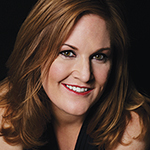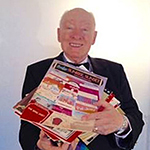Marty Elkins
Marty Elkins Sings Dakota Staton
Pangea, NYC, September 16, 2003
Reviewed by Alix Cohen

Marty Elkins
American jazz vocalist Dakota Staton (1930-2007) appeared and recorded (for Capitol Records) primarily in the 1950s and 1960s. She released thirty albums, including a highly touted collaboration with George Shearing called Dynamic! and Dakota at Storyville, recorded live. Over time, gospel and blues sounds predominated in her singing.
Jazz singer Marty Elkins swings easy, dips into blues, and crosses over to jazz-influenced American Songbook material. “Give Me the Simple Life” (Rube Bloom/Harry Ruby) was bouncy and bright. Elkins tended to come in vocally from the top and often after the beat. She employed melisma (a group of notes sung to one syllable of text) as organically as breathing. MD Janice Friedman’s piano was terpsichorean. Elkins’ eyes closed as Friedman’s head tilted back, with her shoulders shifted.
Among a number of songbook crossovers was George Shearing’s arrangement of “I Hear Music” (Burton Lane/Frank Loesser), which included a deferential tap dance with whooshing brushes by drummer Victor Lesczak and featured Elkins’ neat scatting conversation with the keyboard. Among others were Sammy Cahn/Saul Chapin/Hy Zaret’s “Dedicated to You,” which unspooled long-lined and mellow, and “I’ll Take Romance” (Ben Oakland/Oscar Hammerstein II), which was sung as a waltz with the ease of lying a lazy hammock.
Bill Sanford/Bill Medley’s “Fat Daddy,” the title of Elkins’ most recent CD (my review appears in Cabaret Scenes), was, she tells us, about a bartender at the Frolic Show Bar in Detroit. Her knees were bent with a wiggle down as she swayed and nodded. Yoshi Waki’s bass sidled in, followed by the piano. “Fat Daddy, bring it ho, ho, home to me,” Elkins sang.
“Staton’s biggest hit,” “The Late, Late Show” (Dave Cavanaugh/Roy Alfred) arrived with finger snaps. “She was kind of the liaison between jazz and R&B,” we were told. When Elkins sang “We kiss, ooo /Kiss ooo, all night long,” the “oos” were like subdued squeals, as she were blushing. “Sex Is a Misdemeaner (The More You Miss De Meaner You Get)” (Walter Bishop) had hint of calypso one wished would have gone further. Friedman seemed to be scatting under her breath, much as Jay Leonhart is wont to do.
Bluesy songs were the evening’s highlights. “Ain’t No Use” (Leroy Kirkland/Sidney J. Wyche) arrived with a long-lined lyric and staccato piano. The rhythm evoked burlesque, a sensual bump ‘n’ grind. “Confessin’ the Blues” (Jay McShann/Walter Brown) opened with stealth and tiptoed in on the light cymbal. “I don’t wahhhhnn nobody else—oh yeah” Elkins said; even so, the seduction was at a low simmer. A honky-tonk piano erupted hard, smooth, and sure. “Moonray” (Arthur Quenzer/Artie Shaw/Paul Madison) emerged with a rippling swing punctuated by scat. “Ray” went up like a waterspout, which added frisson.
My sole caveat about this talented vocalist is that she didn’t show enough emotion. Most lyrics were homogenized, with playfulness, distress, and heat at low ebb. That can easily be fixed.
I recommend Pangea. It’s a cozy club with great sightlines, good service, and a friendly atmosphere.





